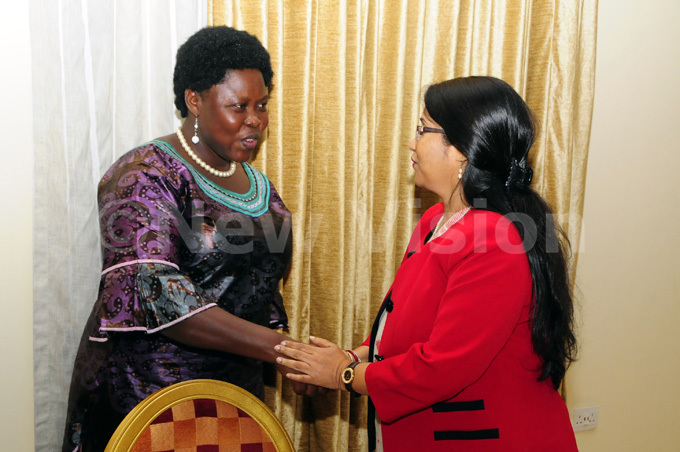Health experts speak out on maternal deaths
Jun 02, 2017
“We should be mourning. We should be angry that so many of our women and children are dying. Then at the funeral, we say: ‘God has called her.

Prof. Francis Omaswa from the African Center for Global Health and Social Transformation (left) chats with state minister for primary health care, Dr. Joyce Kaducu as the the commissioner for child health, Dr. Jessica Nsungwa (center) looks on. This was at Imperial Royale after the opening of a stakeholders' day with a theme; Sustainability of Community Health Workers in addressing maternal and child health, at Imperial Royale Hotel, June 01,2017.
"Giving birth is a beautiful thing. It should not cause mothers to die."
This is the concern that was raised by speaker after speaker during a meeting on maternal and child health in Kampala this week.
Prof. Francis Omaswa, the Executive Director of the African Centre for Global Health and Social Transformation, angrily spoke about how mothers continue to die needlessly as stakeholders look on.
He noted that while the maternal health statistics had improved over the years, the deaths were still far too high.
According to the 2016 Uganda Demographic and Health Survey, the maternal mortality ratio is at 336/100,000 live births compared to 438/100,000 in 2011. The infant mortality is 43/1,000 live births compared to 54/1,000 in 2011.
The survey shows that the deaths are due to preventable causes such as excessive bleeding and lack of skilled care during child birth.
"We should be mourning. We should be angry that so many of our women and children are dying. Then at the funeral, we say: ‘God has called her.' That is nonsense! We should not be talking like that. We are in a position to change this," Omaswa said.
He noted that Uganda had some of the best policies and programmes in the world. However, the challenge was sloppiness in implementation.
"A country like Sri Lanka has achieved good health at low cost. It has implemented policies that we too have. Their health indices are in double digits but we are in threes! We should be ashamed of this," said Prof. Omaswa.
 The state minister for primary health care, Dr. Joyce Kaducu greets BRAC International country director, Hasina Akhter
The state minister for primary health care, Dr. Joyce Kaducu greets BRAC International country director, Hasina Akhter
Sri Lanka's maternal mortality ratio currently stands at about 32/100,000 live births compared to Uganda's 336/100,000 live births.
Omaswa called for the need for an integrated primary health care system. He observed that the recent US$ 140m World Bank grant towards reproductive, maternal and child health would make a difference if well utilised.
"Community health workers cannot be left alone. Make sure district leaders are supporting primary health care and that district health management teams are supported. Review health officers and remove those who are not qualified," said Omaswa.
"The money should also support operationalization of theatres at Health Center IVs and skilling of personnel. The infrastructure and policies already exist. Can we get a system to implement these things and ensure they are working?" he implored.
Omaswa made the remarks while speaking at the Innovating for Maternal and Child Health in Africa (IMCHA) stakeholder's meeting in Kampala on Thursday. The event aimed at, among other issues, assessing policies and identify health system gaps, equity concerns and other barriers to service access.
Reacting to the concerns, the primary health care state minister Dr. Joyce Moriku also said: "Women should not die while giving life. Neither should their children die when they are embracing life."
Moriku particularly expressed concern over reported deaths resulting out of births by caesarean sections. She challenged researchers to do comprehensive studies on the topic.
"Why are we losing more mothers to C-sections? Is that the skills are wanting? A mother comes to theatre alive but leaves in a coffin. This is unacceptable. But we want evidence based and credible information research to inform our interventions," said Moriku.
